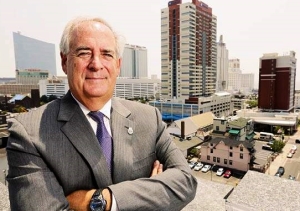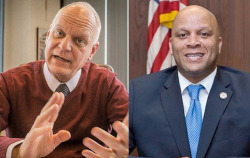
The current effort to remove iGaming revenue from the calculation of the PILOT (payment in lieu of taxes) program in Atlantic City brings out the worst in the casino industry and local politicians.
Let’s recall that Atlantic City gets no sports betting revenue tax unlike other areas of New Jersey where racetracks are located and sports betting is conducted because Atlantic City supposedly has the “benefit” of all the legal casinos in the state located within its boundaries (something we’ll come to later in this piece). The “benefit” of casinos to Atlantic City has been overblown for years. Yes, Atlantic City imposed property taxes on casinos like any business in any other city. But when casino revenues started to decline during the recession of 2007-2010, casinos would routinely appeal their property tax value and almost always received a rebate, making city finances a shaky thing. And let’s also not overlook that New Jersey was just the second state to legalize gaming in the U.S. and the concept of casinos paying anything more than simple property taxes to the municipality where they were located was not yet established. Today, however, it’s routine for casinos in most states to pay fees on gaming devices, a percentage of win or some other calculation to the host jurisdiction. Atlantic City gets nothing like that.
So when the appeal of property taxes became an epidemic, state officials came up with the idea of the PILOT program where, instead of paying property taxes, casinos would pay a percentage of the gross gaming win to the city. So the better the casinos did, the better the city did. Made sense and avoided those nasty appeals that not only required the city to pay millions in tax rebates but also cost millions in legal fees to fight such a move. At that time, online gaming revenues were miniscule compared to the land-based revenue, so there was no thought of separating the two. The bill was signed into law in 2016 for a period of 10 years.
But as casinos began to close, the PILOT payments began to shrink, and the city had to raise taxes on residences and small businesses to make up for the shortfall. The result is a wildly fluctuating tax rate that causes property values to fall, businesses to flee the city, and chokes off investment in the city because when you can’t predict a stable tax rate over the next five years, you can’t predict a return on your investment. Lots of good ideas of how to turn around Atlantic City have fallen victim to that uncertainty.
In the meantime, the state came in and took over the finances of the city, taking all the power away from local officials. Now granted, local officials have rarely performed adequately in handling city finances, but the state has taken extraordinary steps to make up that gap between the city budget and the failing PILOT program, borrowing millions of dollars and plunging a failing city into even greater debt, a hole that has no way out.
During the pandemic, Atlantic City’s share of the PILOT revenue fell even farther because casinos were closed for four months. But the one thing that didn’t dry up completely was iGaming revenue. It was a bulwark against a complete melt down of the finances of Atlantic City.
And now state officials want to remove that bulwark so the city would be at constant threat of zero casino taxes should another pandemic occur. And the worst part? It’s being led by politicians who supposed are “friendly” to Atlantic City including our two assemblymen who supposedly represent the city and its residents, Vince Mazzeo and John Armato. Spearheading this effort is Senate President Steve Sweeney, who has usually supported measures to improve Atlantic City. Now, is it just a coincidence that all three of these “representatives” recently lost their bids for re-election, signaling that the voters were unhappy with the jobs they were doing?
This bill would irreparably damage Atlantic City. Newly elected state Senator Vince Polistina and Assembly members Don Guardian and Claire Swift oppose this bill as any public official representing Atlantic City should. It is, as they say, a no-brainer.
Anyone who has visited Atlantic City lately should be concerned. Atlantic City has always suffered the same ills as any large city in the northeastern U.S. Crime, homelessness, a lack of sanitation and upkeep of the roads can be found anywhere in this region, so it’s not surprising that Atlantic City is afflicted by the same symptoms. But with less money to devote to public safety, sanitation, and infrastructure improvements, Atlantic City will become even less attractive to visitors, many of whom already opt for Pennsylvania, Connecticut or New York casinos usually located in safe suburban locations. The perception of Atlantic City will clearly fall among people considering a visit to Atlantic City casinos, making it more difficult for casinos to attract new customers.
The argument for the bill is that online gaming revenue is money earned by bets made outside of the Atlantic City borders, therefore that revenue should not be split with Atlantic City. But the very justification for the legalization of online gaming and sports betting in New Jersey said the bets were being made inside the borders because the servers that transmit those bets are located in Atlantic City. This was the justification of legalizing online gaming to begin with. Remember, casino gambling is illegal in New Jersey unless it’s conducted in Atlantic City, the only jurisdiction where it is legal as per the state Constitution, amended in 1976 to legalize casino gambling only in Atlantic City. If online gaming and sports bets were legal outside of Atlantic City, a second constitutional amendment would have been necessary so the technicality of bets being made on the servers in Atlantic City was invented. So the blatant hypocrisy of removing online gaming revenue from the PILOT calculations is astounding.
So let’s finally talk about why this is happening now. Why would the very representatives that are supposed to support the needs of their constituents turn their back on them? There has been no public campaign by the Casino Association of New Jersey to implement these measures. Since casino companies and their executives are prohibited from contributing to the campaigns of state politicians, there can’t be an quid pro quo here. But there has to be some coordination for one reason or another to have the politicians support this bill. The fact that this bill only benefits the casinos makes it that much more suspicious. It’s not going to create more jobs. It’s not going to convince the casinos to reinvest in their properties. It’s only going to benefit the casinos’ bottom line. It stinks to high heavens and the casino industry and the politicians supporting this bill have much to answer for. This bill should be shelved for the benefit of everyone involved, including the casinos.


















 When Don Guardian was elected mayor of Atlantic City in 2013, he beat all the odds—a gay, white Republican in a predominantly African American city, he defeated a sitting mayor by cobbling together a diverse coalition of all creeds, races and sexual orientations. But soon after he was elected, Governor Chris Christie enforced a state takeover of the city, overseeing Atlantic City’s finances and creating a fued between the state and the city that still persists. Guardian is up for re-election in November, facing similar odds he overcame four years ago. He spoke with Publisher Roger Gros, an Atlantic City resident, at his offices in City Hall in August.
When Don Guardian was elected mayor of Atlantic City in 2013, he beat all the odds—a gay, white Republican in a predominantly African American city, he defeated a sitting mayor by cobbling together a diverse coalition of all creeds, races and sexual orientations. But soon after he was elected, Governor Chris Christie enforced a state takeover of the city, overseeing Atlantic City’s finances and creating a fued between the state and the city that still persists. Guardian is up for re-election in November, facing similar odds he overcame four years ago. He spoke with Publisher Roger Gros, an Atlantic City resident, at his offices in City Hall in August. Frank Gilliam has been a city councilman in Atlantic City for the past eight years. This year, he received the Democrat nomination for mayor, defeating the popular councilman Marty Small in the primary. He is running against the incumbent mayor, Don Guardian, who has been in office for the past four years. Gilliam is a lifelong resident of Atlantic City and speaks about his views of the city as it is today and his plans to revive the city if he is elected. He spoke with Casino Connection Publisher Roger Gros in mid-October at his campaign headquarters in Atlantic City.
Frank Gilliam has been a city councilman in Atlantic City for the past eight years. This year, he received the Democrat nomination for mayor, defeating the popular councilman Marty Small in the primary. He is running against the incumbent mayor, Don Guardian, who has been in office for the past four years. Gilliam is a lifelong resident of Atlantic City and speaks about his views of the city as it is today and his plans to revive the city if he is elected. He spoke with Casino Connection Publisher Roger Gros in mid-October at his campaign headquarters in Atlantic City.


